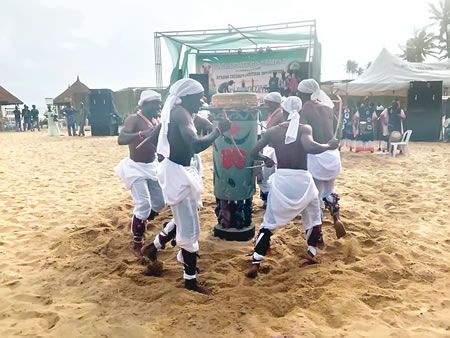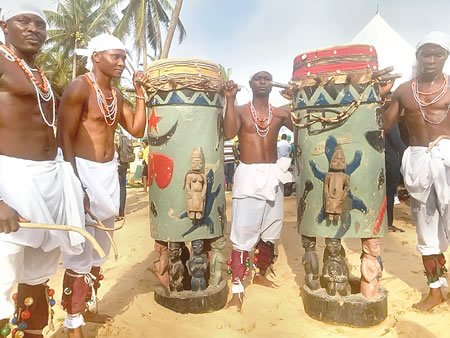
AKIN ADEWAKUN and SEGUN KASALI, who were among many others who participated during the recently-held coconut festival, reports that the celebration not only lit up Badagry but depicts the rich cultural heritage of the people and their deep-seated connection with the fruit.
Coconut, no doubt, holds a major significance for the people and residents of Badagry, a coastal town in the Badagry Local Government Area of Lagos. Besides, once being a money-spinner for the people of this community, edged in between Lagos and Seme Border, Benin Republic, history has it that the community’s affinity with the fruit dates back to 1845, when the first set of white men established the first coconut plantation in the town. And for years, the fruit has been synonymous with the community since it enhances both its cultural heritage and the people’s economy.
ALSO READ: I want to lose weight
However, things have since changed. Those coconut-induced gains seem to be gradually dipping. And for the people and residents of this community, the sentimental attachment to this staple is gradually waning.
Not a few therefore see the decision of the Lagos State government to fully throw its weight behind this year’s coconut festival, as a way of reviving the communities waning cultural glories and again restore the age-old bond between it and the fruit.
For instance, nearly all the inhabitants of the 56 towns and villages of the Badagry division thronged the Sultan Beach Front, venue of this year’s celebration of the coconut festival, over the weekend, to be part of the coconut festival, which the state government explained was designed at creating awareness on the array of invaluable economic, health and environmental benefits that the coconut fruit offers.

According to the senior special assistant to the chairman of Badagry West LCDA on information, Mr Solomon Zosu, whose community played host to the coconut festival, tagged, ‘Harnessing Coconut Production for Economic Empowerment and Tourism Development in Lagos State,’ was a way of re-establishing the coastal community with its rich history.
“Badagry was the first point of contact the coconut plantation was established in 1845; that’s about 173 years ago; hence the importance the average indigene of the area attaches to the fruit,” he stated. He added that Badagry has huge coconut farms on the island called Gberefu, a community that also forms a significant part of the history of Badagry, since it was used as a major port during the slave trade.
“That is why if you get to Gberefu land, you will see a lot of coconut plantations, which were established by the whites, when they first arrived in Badagry,” he added.
Zosu also insisted that Badagry has other ‘firsts’ to flaunt, besides its coconut prowess. For instance, while the first storey building in Nigeria domiciled in the community, the town also boasts of the fact that the first missionary in the country, was from there.
“I doubt if there is any other community that can match the rich historical antecedents of the community. Badagry is a land of history and that is why we are so elated that some of those things that are part of that history are being re-enacted. Besides boasting of huge coconut plantations, we also have the first storey building in Badagry. And don’t forget that the first missionary was from Badagry. And till date, we still have so many slave trade and slave relics here,” he said
Zosu expressed delight at the decision of the state government to throw its weight behind this year’s festival, noting that the development would go a long way in elevating the festival and showcasing the huge cultural heritage of the people of Badagry to the world.
He noted that the carnival-like atmosphere at the event had gone a long way in adding colour to the event, thereby making it attractive to prospective tourists, while further positioning the community as a tourism haven.
He however appealed to residents and indigenes of the community to desist from indiscriminate felling of coconut trees in the area especially for the purpose of roof construction, if the community really wanted to regain its pride as the coconut haven of the state.
“Recent research has revealed to us that more coconut trees are being felled than planted, a development that we can say has been responsible for the waning popularity of the community as the coconut centre of the state. So there is the need to do some advocacy and educate the people that cutting these trees and using them for roofing, without replacement will not be of economic value to us.
“We are trying to let them know the economic value of this fruit, apart from its health benefits that they already know. You know they are traditionally-inclined. They know the use of the water. But the economic value is what this programme has been able to help to expose,” he added.
Speaking at the 2018 coconut festival, the Lagos State Governor, Mr Akinwunmi Ambode, expressed the state government’s commitment to drawing global attention to the community and enhancing its economy by engaging ten major bakeries in the state, to ensure mass production of coconut bread in order to generate more market revenue through coconut utilisation.
Ambode, who was represented at this year’s coconut festival by his Special Adviser on Environment, Mr. Baba Tunde Hunpe, identified coconut as the most useful single tree in the world in terms of versatility, product utilisation and longevity.
The state’s number one citizen added that the decision of Lagos to participate in this year’s festival had become imperative since it would go a long way in helping the state government take coconut to another level.
“Nigeria is ranked 18th in the world as a coconut- producing country and Lagos State is contributing 70 per cent of the total production. Our government places high premium on sustainable food production which is the impetus, driving the various activities in the agricultural sector with a renewed commitment.
“A major step taken towards achieving this goal is the establishment of the Lagos State Coconut Development Authority (LASCODA) to uphold the state’s comparative advantage in coconut production,” he said.
Ambode expressed the state’s commitment to rehabilitating the coconut belt, massive production of improved coconut seedlings, capacity building and empowerment of coconut value chain actors.
“We have channelled a lot of resources into creating enduring infrastructural architecture that would ensure that the state’s tourism potential is fully harness for all round economic growth and development. We will continue to create the enabling environment for investment in coconut production, commercialisation and utilisation” he ended.
Speaking also, the Lagos State Commissioner for Agriculture, Mr Toyin Suarau stated that the state understands the importance of coconut to its economy, adding that the crop has continued to generate job opportunities for its teeming youths.

The commissioner, who was represented by the Permanent Secretary of the Ministry, Mr Olayiwola Onasanya, expressed delight that the occasion presented a unique opportunity to create awareness on the array of invaluable economic, health and environmental benefits that coconut offers.
The Special Adviser to the Governor on Arts and Culture, Mrs. Aramide Giwanson explained that the state had marked the date on its calendar to further demonstrate its total commitment and support for the coconut festival.
“We are making it a significant part of the calendar of the Ministry of Tourism. This way, we are giving assurance that this would be sustained. We are not going back. They started in 2009 with just little support. But now that it is in our calendar of events, it has come to stay and we will give it our utmost support,” she revealed.
She also disclosed plans by the state government to export coconut, produced in the state, to other countries, a move she argued would be of immense economic value to the community; since it accounts for 70 per cent of coconut produced in the state.
Giwanson also expressed hope that the festival would have significant impact on tourism in the community and the state in general.
The chairman, Badagry West LCDA, Gbenu Henugbe, the host of the festival, harped on the importance of coconut to human being, describing coconut oil and cream as of immense health benefits to humans.
“Everything about coconut is useful. Nothing goes to waste. We use it to cook food and also use the water. The root is also very useful in the sense that it is medicinal. Coconut is an advantage to human beings,” he said.
He explained further that the importance of the festival was to stress the need for the people of the area to go back to the coconut-planting culture because of the huge benefits inherent in such venture.
“The festival is to tell the people of the community that they should all be good coconut farmers. Badagry is the first place coconut was planted in Africa. If you get to my village, you will see a lot of coconut trees that my grandfather and father planted. I have also planted some because I believe in the huge importance of coconut to the community,” he stated.
To further buttress this, there are some special delicacies in the community’s culinary, prepared with coconut oil, beans, onions and other ingredients.
“There’s one food called Samgbeji, which is prepared with coconut oil, beans, onion and other ingredients. Even the coconut oil is medicinal,” he added. Henugbe, therefore, urged the Federal Government to encourage them by providing more lands and money so they can get tractors and fertilizer that would make them embark on mechanised farming and consequently boost the economy of the nation also.
The community’s rich culture was also on parade. For instance, the Sato Drummers were the cynosure of all eyes at the event as they moved, danced and manoeuvred the twin giant drums to different parts of the venue.
Expressing the group’s delight at the coconut festival, its leader, Kotin Hongbe from Ajara Gamade community in Badagry, stated that it was an opportunity for the cultural group and others to exhibit some of the cultural traits that made Badagry tick in the past.
According to him, the twin drums, carved in form of a male and female, are not without their significance to the community. They are drummed to ward off evil from the land, appease the gods and send witches away from the land.
“We believe if there is pestilence in the land, and this Sato drum is beaten, such pestilence will stop. Besides they are beaten to drive away witches and evil spirits from the land,” Hongbe stated.
No doubt, the recently-held coconut festival has again opened up the rich cultural tradition of the coastal community to the world. Not a few, therefore, believe that with more commitment on the parts of government and residents alike, the journey to reclaiming the community’s lost glory has just begun.



